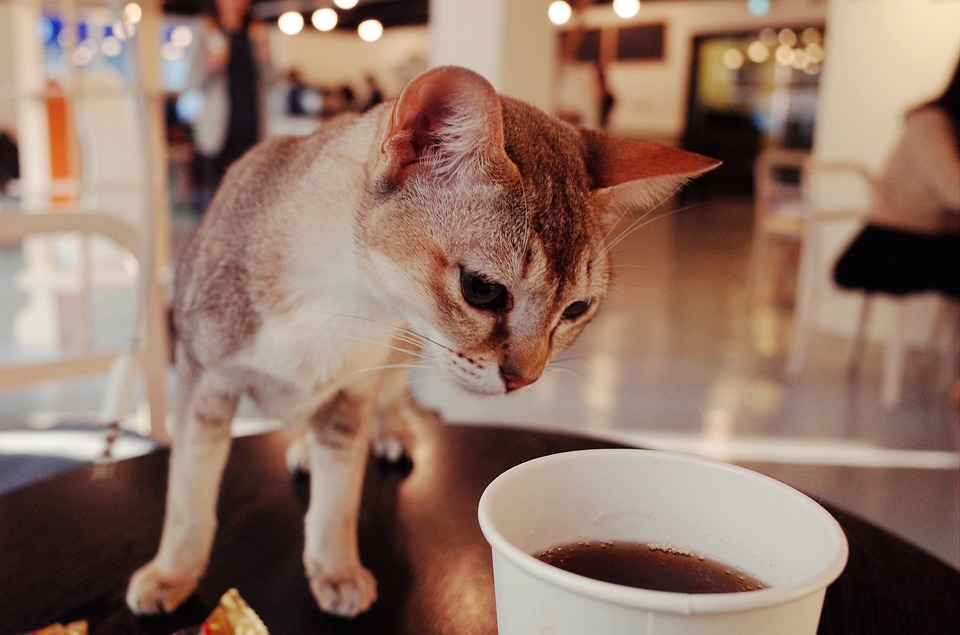Cats are curious creatures. When they see something they don’t recognize they will try their best to get their paws on that object by all means necessary. Especially if you’re eating or drinking something, they’ll want to know what it is and will want to sniff it and even taste it. They’ll act cute and try to melt your heart with their innocent looks, they’ll lightly tap you if you ignore them, then they’ll jump up on tables and counters and start becoming persistent. More too often they might even just stick their heads into your plate or mug invited and there’s nothing you can do about it.
But everything that we eat might not be appropriate for our feline friends. In fact, there are so many food and drink items that are a part of our daily routines which we love to consume but if given to our cats might turn out to be toxic for them, which is a scary thought.
Coffee is practically a staple in most of our diets. As a morning pick me up or as a fuel booster throughout the day we survive on coffee. But is it safe for our cats? If we leave our mugs and they end up taking a few laps of our leftover coffee will they suffer any health risks?
Can cats drink coffee?

The simple answer to your question is: no, your cat shouldn’t be given coffee in any shape or form because it is toxic for them. A sip here or there won’t be lethal for your cat, but if consumed in large amounts, coffee can be fatal to your feline friend.
The reason why coffee is so harmful to your cat is that it contains large amounts of caffeine which is toxic to your cat’s system. Caffeine is dangerous to cats because it contains a chemical known as theobromine which causes jitters and shakes and your kitty’s body cannot handle these reactions. Because of their sensitivity to caffeine, even small doses can lead to serious health problems for your cat. Other than theobromine coffee and caffeine also contain methylxanthine and xanthine which are also toxic to animals.
Even decaffeinated coffee isn’t something you should be giving your cats. Even if there isn’t any caffeine, other elements in coffee are also toxic to your cat’s health.
What happens to my cat when it drinks coffee?
The answer to this question depends on several factors. If your cat is healthy and fit and is an adult cat with no health problems that happened to take a few licks of coffee will probably face very few adverse effects on the coffee. However, if your cat suffers from other health problems and their immune system is weaker than healthy cats, or if your cat is still a little kitten then they are more likely to become sick. If your cat, adult, or kitten, healthy or otherwise takes in more than just a few licks here and there, they will begin to suffer from coffee poisoning and will require immediate medical help.
How to spot coffee poisoning in cats?
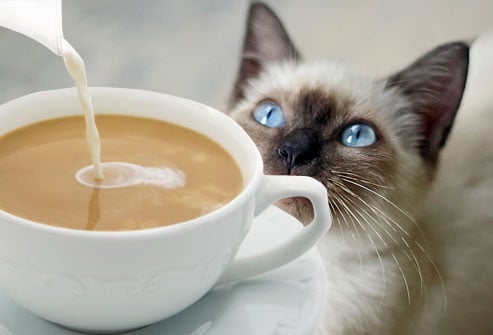
The very first sign that your cat has ingested too much coffee and is possibly going through coffee poisoning will be the fact they will seem agitated and anxious. Their behavior will resemble a human’s reaction to drinking way too much coffee; they will be jittery and overly excited, restless, and skittish. Your cat’s heart rate will be elevated and her blood pressure and body temperature will also be on the rise. Your cat will also start to lose their appetite and may even begin vomiting.
Other symptoms of coffee poisoning to look out for include:
- Hyperactivity that can be mild or severe
- Diarrhea
- Abdominal discomfort
- Rapid breathing
- Signs of nervousness including seizures, tremors, or even collapse
- Coma
In the more severe cases of coffee poisoning, your cat will suffer from an increased heart rate which in itself is fatal to your cat. If you suspect that your cat has had more than just a few licks and are worried about the possible health risks make sure not to waste any time and take your cat straight to the vet. The earlier your vet can examine and diagnose your cat, the sooner the treatment can begin.
Treatment for Coffee Poisoning:
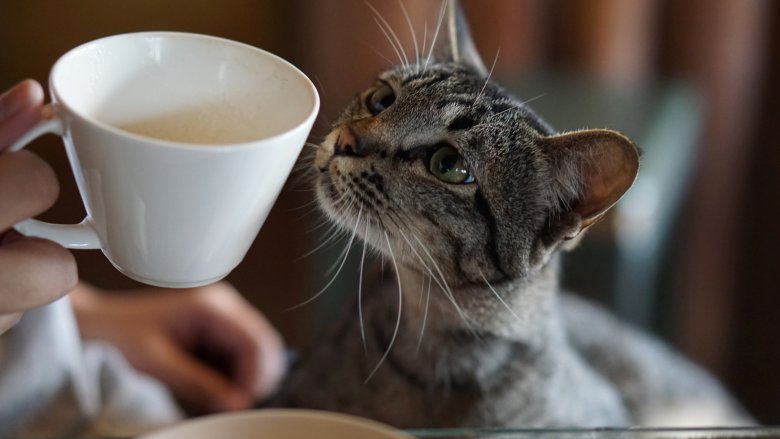
Once you take your cat to the vet and coffee poisoning is confirmed the most immediate action that the vet will take will be to flush out your cat’s system. They may even give your cat activate charcoal to absorb the ingested caffeine from their system. Other treatments, which depend on the symptoms your cat has shown, include:
- IVs especially if your cat has been vomiting to avoid dehydration
- Medication to lower their blood pressure and to treat their abnormal heart rate
- If your cat was suffering from seizures they will give anti-convulsants
- Coffee is acidic and so your cat may be given antacids to treat possible tummy aches
- In some cases, a urinary catheter might have to be used to empty your pet cat’s bladder to prevent coffee absorption in the bladder wall
Other elements in coffee that are harmful to our cats:
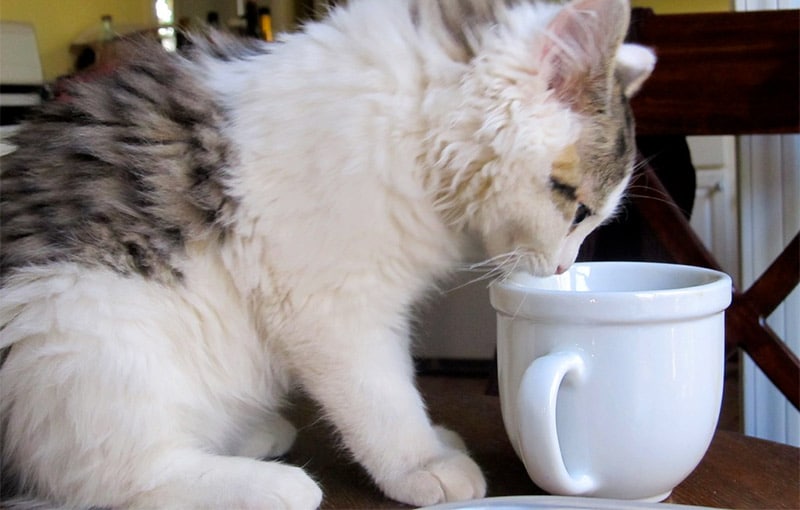
It’s not just coffee and the caffeine that is present in the coffee we drink that is harmful to feline friends. The milk we commonly use including in our coffee is cow milk. Despite the image we’ve grown up of cats drinking milk and milk is a part of their staple diet, it’s actually not something you should be giving your cats. Cats are lactose intolerant and so they suffer from upset stomachs, vomiting, and diarrhea if given milk in even moderate quantities. Dairy creamers will also have the same negative impact on their stomachs.
We also tend to use artificial sweeteners and sugar in our coffees. Artificial sweeteners are also a huge health risk for cats and need to be avoided at all costs. They cause insulin release in cats that can lead to liver failure in the long run.
What other things contain caffeine that should be avoided?
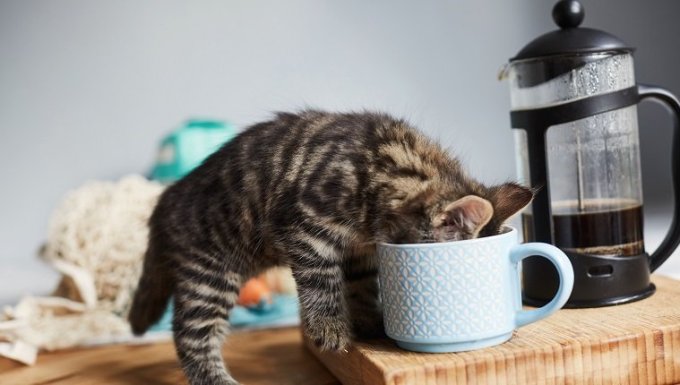
Caffeine isn’t only present in coffee. There are so many common household drinks and foods that contain caffeine that should be strictly kept out of reach from your cats. These include:
- Tea
- Sodas
- Energy drinks
- Chocolate
- Green tea
What should I give my cat to drink then?
By rule of thumb, your cat doesn’t need to drink anything other than water especially if you feed your cat dry food, you should encourage your cat to drink more water to keep them from getting dehydrated.
Milk is not a staple part of your cat’s diet. If you feel like you want to include it as a rare treat in your cat’s diet then the best option to opt for is goat milk. That is the most suitable for their system. Plant-based milk such as almond or soy is not a good option and should also be avoided.
Pet owners should be aware of what is safe to feed their pets to ensure they stay healthy and live a long healthy life.
